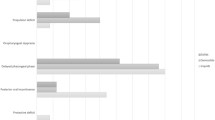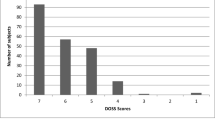Abstract
We investigated the progression of oropharyngeal dysphagia in patients with multiple system atrophy (MSA), with particular emphasis on MSA subtype variation. Fifty-nine MSA patients (31 MSA-P, 21 MSA-C, and 7 MSA-PC) who had undergone at least one videofluoroscopic swallowing study (VFSS) to evaluate dysphagia symptoms were included. Clinical data and VFSS findings were retrospectively evaluated using the videofluoroscopic dysphagia scale (VDS), and the results of each MSA subtype group were compared. The median latency to onset of diet modification from onset of MSA symptoms was 5.995 (95% CI 4.890–7.099) years in all MSA patients, 5.036 (95% CI 3.605–6.467) years in MSA-P, and 6.800 (95% CI 6.078–7.522) years in MSA-C (P = 0.035). The latency to onset of diet modification from onset of dysphagia symptoms was 2.715 (95% CI 2.132–3.298) years in all MSA patients, 2.299 (95% CI 1.194–3.403) years in MSA-P, and 5.074 (95% CI 2.565–7.583) years in MSA-C (P = 0.039). The latencies to onset of tube feeding from onset of MSA symptoms and dysphagia symptoms were 7.003 (95% CI 6.738–7.268) years and 3.515 (95% CI 2.123–4.907) years, respectively, in all MSA patients, without significant difference between subtypes. In the patients who underwent VFSS follow-up for ≥ 1 year, 6 oral VDS items significantly worsened; only two pharyngeal items exhibited significant changes. Patients with MSA-P commenced diet modification earlier than patients with MSA-C, despite no significant difference in the latency to onset of tube feeding. Deterioration of dysphagia may be more pronounced in the oral function of MSA patients.


Similar content being viewed by others
References
Köllensperger M, Geser F, Seppi K, Stampfer-Kountchev M, Sawires M, Scherfler C, et al. Red flags for multiple system atrophy. Mov Disord. 2008;23:1093–9.
Gilman S, Wenning GK, Low PA, Brooks DJ, Mathias CJ, Trojanowski JQ, et al. Second consensus statement on the diagnosis of multiple system atrophy. Neurology. 2008;71:670–6.
Wenning GK, Geser F, Krismer F, Seppi K, Duerr S, Boesch S, et al. The natural history of multiple system atrophy: a prospective European cohort study. Lancet Neurol. 2013;12:264–74.
Higo R, Tayama N, Watanabe T, Nitou T, Ugawa Y. Videofluoroscopic and manometric evaluation of swallowing function in patients with multiple system atrophy. Ann Otol Rhinol Laryngol. 2003;112:630–6.
Müller J, Wenning GK, Verny M, McKee A, Chaudhuri KR, Jellinger K, et al. Progression of dysarthria and dysphagia in postmortem-confirmed parkinsonian disorders. Arch Neurol. 2001;58:259–64.
Higo R, Nito T, Tayama N. Swallowing function in patients with multiple-system atrophy with a clinical predominance of cerebellar symptoms (MSA-C). Eur Arch Otorhinolaryngol. 2005;262:646–50.
Alfonsi E, Versino M, Merlo IM, Pacchetti C, Martignoni E, Bertino G, et al. Electrophysiologic patterns of oral-pharyngeal swallowing in parkinsonian syndromes. Neurology. 2007;68:583–9.
Pfeiffer RF. Gastrointestinal dysfunction in Parkinson’s disease. Lancet Neurol. 2003;2:107–16.
Hunter PC, Crameri J, Austin S, Woodward MC, Hughes AJ. Response of parkinsonian swallowing dysfunction to dopaminergic stimulation. J Neurol Neurosurg Psychiatry. 1997;63:579–83.
Low PA, Reich SG, Jankovic J, Shults CW, Stern MB, Novak P, et al. Natural history of multiple system atrophy in the USA: a prospective cohort study. Lancet Neurol. 2015;14:710–9.
Kim H-J, Jeon BS, Lee J-Y, Yun JY. Survival of Korean patients with multiple system atrophy. Mov Disord. 2011;26:909–12.
Watanabe H, Saito Y, Terao S, Ando T, Kachi T, Mukai E, et al. Progression and prognosis in multiple system atrophy: an analysis of 230 patients. Brain. 2002;125:1070–83.
Logemann JA. The evaluation and treatment of swallowing disorders. Curr Opin Otolaryngol Head Neck Surg. 1998;6:395–400.
Kim J, Oh BM, Kim JY, Lee GJ, Lee SA, Han TR. Validation of the videofluoroscopic dysphagia scale in various etiologies. Dysphagia. 2014;29:438–43.
Ueha R, Nito T, Sakamoto T, Yamauchi A, Tsunoda K, Yamasoba T. Post-operative swallowing in multiple system atrophy. Eur J Neurol. 2016;23:393–400.
Umemoto G, Furuya H, Tsuboi Y, Fujioka S, Arahata H, Sugahara M, et al. Dysphagia in multiple system atrophy of cerebellar and parkinsonian types. J Neurol Neurosci. 2017;08:1–8.
Rangarathnam B, Kamarunas E, McCullough GH. Role of cerebellum in deglutition and deglutition disorders. Cerebellum. 2014;13:767–76.
Suzuki M, Asada Y, Ito J, Hayashi K, Inoue H, Kitano H. Activation of cerebellum and basal ganglia on volitional swallowing detected by functional magnetic resonance imaging. Dysphagia. 2003;18:71–7.
Geser F, Wenning GK, Seppi K, Stampfer-Kountchev M, Scherfler C, Sawires M, et al. Progression of multiple system atrophy (MSA): a prospective natural history study by the European MSA study group (EMSA SG). Mov Disord. 2006;21:179–86.
Lee S-W, Koh S-B. Clinical features and disability milestones in multiple system atrophy and progressive supranuclear palsy. J Mov Disord. 2012;5:42–7.
Palmer JB, Pelletier CA, Matsuo K. Rehabilitation of patients with swallowing disorders. In: Braddom RL, editor. Physical medicine and rehabilitation. 4th ed. Philadelphia: Elsevier; 2011. p. 581–600.
Lundy DS, Smith C, Colangelo L, Sullivan PA, Logemann JA, Lazarus CL, et al. Aspiration: cause and implications. Otolaryngol Head Neck Surg. 1999;120:474–8.
Dodds WJ, Logemann JA, Stewart ET. Radiologic assessment of abnormal oral and pharyngeal phases of swallowing. Am J Roentgenol. 1990;154:965–74.
Hanson L. Subjective Distresses of nasogastric tube feeding. J Parenter Enter Nutr. 1979;3:53–7.
McNamara EP, Kennedy NP. Tube feeding patients with advanced dementia: an ethical dilemma. Proc Nutr Soc. 2001;60:179–85.
Funding
This study was not supported by any grant or funding.
Author information
Authors and Affiliations
Corresponding author
Ethics declarations
Conflict of interest
The authors declare that they have no conflict of interest.
Ethical Approval
All procedures performed in studies involving human participants were in accordance with the ethical standards of the institutional research committee and with the Helsinki declaration and its later amendments or comparable ethical standards.
Informed Consent
This study did not need the informed consent because it was a retrospective study with ethical approval.
Additional information
Publisher's Note
Springer Nature remains neutral with regard to jurisdictional claims in published maps and institutional affiliations.
Rights and permissions
About this article
Cite this article
Do, H.J., Seo, H.G., Lee, H.H. et al. Progression of Oropharyngeal Dysphagia in Patients with Multiple System Atrophy. Dysphagia 35, 24–31 (2020). https://doi.org/10.1007/s00455-019-09990-z
Received:
Accepted:
Published:
Issue Date:
DOI: https://doi.org/10.1007/s00455-019-09990-z




